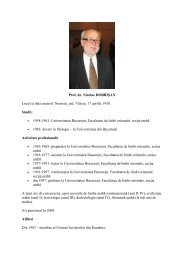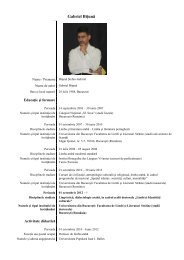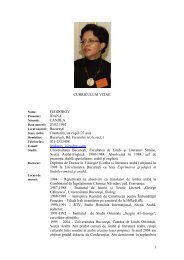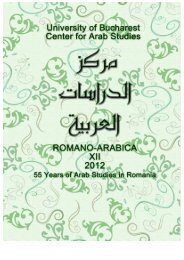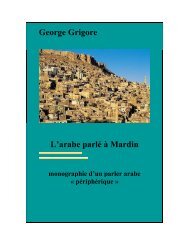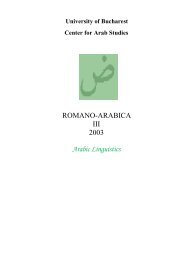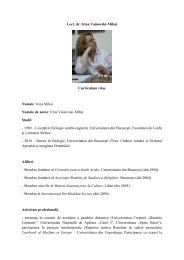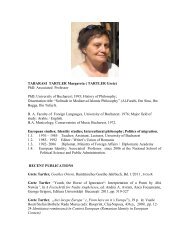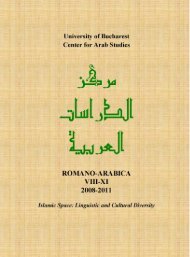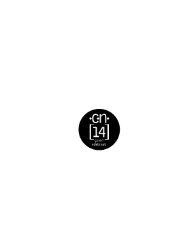University of Bucharest
University of Bucharest
University of Bucharest
You also want an ePaper? Increase the reach of your titles
YUMPU automatically turns print PDFs into web optimized ePapers that Google loves.
However, such an analysis runs into conceptual and empirical problems<br />
since there is no independent evidence for a zero-complementizer. I therefore<br />
conclude that Romanian Pidgin Arabic has no complementizers (overt or zero).<br />
5. The lexicon<br />
The size <strong>of</strong> the core vocabulary <strong>of</strong> Romanian Pidgin Arabic amounts to<br />
approximately 150 words. This accords well with the figures reported for some<br />
pidgins: 50-100 for New Hebrides Jargon English (Mühlhäusler 1997); 150-200<br />
for Russenorsk (Romaine 1988); 300 for Samoan Plantation Pidgin English<br />
(Mühlhäusler 1997).<br />
As for the origin <strong>of</strong> the vocabulary, Egyptian and Iraqi Arabic account for<br />
some 75% <strong>of</strong> the lexical items, and Romanian and English for the remaining 25%.<br />
The vocabulary includes a number <strong>of</strong> lexical hybrids 16 :<br />
(44) a. giv / gib ‗to give; to bring‘, cf. E. give and Eg. Ar. gib ‗bring!‘<br />
b. la ‗PREP‘, cf. Rom. la ‗at, to, in‘ and Ar. li ‗for‘<br />
c. no ‗NEG‘, cf. E. no and Rom. nu<br />
d. problem [pro’blem] ‗problem‘, cf. E. problem and Rom. problemă<br />
[pro’blemə]<br />
The forms in (45a) are a consequence <strong>of</strong> the replacement <strong>of</strong> /v/ by /b/,<br />
mentioned in section 2. The form in (45d) ends in [m], as in English, but has the<br />
stress pattern <strong>of</strong> its Romanian counterpart. Lexical hybrids are found in other<br />
pidgins, e.g. Russenorsk (Broch and Jahr 1981):<br />
(45) po ‗on‘, cf. Rus. po, Norw. på<br />
In spite <strong>of</strong> the extremely small size <strong>of</strong> the vocabulary, lexical doublets and<br />
even synonymic series do occur. Their existence is due to their different<br />
etymology:<br />
(46) a. mašina < Rom. maşină and sayara < Ar. sayyāra ‗car‘<br />
b. zen < Ir. Ar. zēn, kuwais < Eg. Ar. kuwayyis and gud < E. good<br />
16<br />
Lexical items identified across languages (Mühlhäusler 1997).<br />
23



